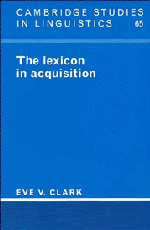Book contents
- Frontmatter
- Contents
- Acknowledgments
- 1 The lexicon: words old and new
- 1 LEXICAL ACQUISITION
- 2 CASE STUDIES OF LEXICAL INNOVATION
- 8 Words for things
- 9 More words for things
- 10 Words for agents and instruments
- 11 Words for actions
- 12 Words for undoing actions
- 3 CONCLUSION
- Bibliography
- Index of names
- Index of subjects
8 - Words for things
Published online by Cambridge University Press: 05 July 2011
- Frontmatter
- Contents
- Acknowledgments
- 1 The lexicon: words old and new
- 1 LEXICAL ACQUISITION
- 2 CASE STUDIES OF LEXICAL INNOVATION
- 8 Words for things
- 9 More words for things
- 10 Words for agents and instruments
- 11 Words for actions
- 12 Words for undoing actions
- 3 CONCLUSION
- Bibliography
- Index of names
- Index of subjects
Summary
Young children often wish to talk about things they have no words for. When this happens, they can fill the gap by coining a word just for the occasion. Such coinages form the topic of this and the next chapter. Children acquiring English coin many nouns, mostly words for things. The forms they produce and the order in which they master different forms are the topic of this chapter. I focus first on data from English and other Germanic languages, and then, in the next chapter, take up similar data from children acquiring other types of languages. Where possible, I have drawn on languages for which there are both diary observations and vocabulary records. For a few, there is also systematic elicitation of novel word-forms. All the data are drawn primarily from children under six. For each language, I take up predictions from transparency, simplicity, and productivity, and test them against the data available. I also consider how language typology affects and is affected by children's reliance on these factors.
English
As we saw in Chapter 1, English has two major options for forming new words: compounding and derivation. Derivation can be either with or without affixes. With compounding, nouns are formed from two or more nouns (as in egg-plant or house-key), known as root compounds, or from one or more nouns combined with a verb (as in push-chair or marathonrunner), known as synthetic compounds.
- Type
- Chapter
- Information
- The Lexicon in Acquisition , pp. 143 - 159Publisher: Cambridge University PressPrint publication year: 1993

